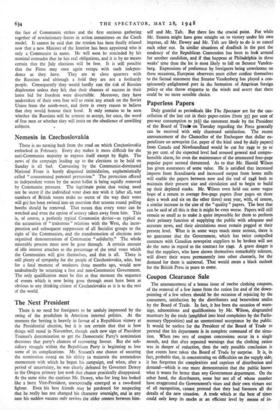The Next President
There is no need for foreigners to be unduly impressed by the swing of the pendulum in American internal politics. At the moment the betting is heavily in favour of a Republican victory at the Presidential election, but it is not certain that that is how things will stand in November, though each new sign of President Truman's determination to get the Democratic Party's nomination decreases that party's chances of recovering favour. But the sub- sidiary struggle within the Republican Party is beginning to lose some of its complications. Mr. Stassen's one chance of securing the nomination rested on his ability to maintain the tremendous momentum with which he began his campaign, and when, after a period of uncertainty, he was clearly defeated by Governor Dewey in the Oregon primary last week that chance practically disappeared. At the same time the cautious Mr. Dewey, who for long has looked like a born Vice-President, unexpectedly emerged as a two-fisted fighter. Even his best friends may be pardoned for suspecting that he really has not changed his character overnight, and in any case his sudden success only revives the older contest between him-
self and Mr. Taft. But there lies the crucial point. For while Mr. Stassen might have gone straight on to victory under his own impetus, all Mr. Dewey and Mr. Taft are likely to do is to cancel each other out. In similar situations of deadlock in the past the tendency of the Republican Convention has been to look around for another candidate, and if that happens at Philadelphia in three weeks' time then the lot is most likely to fall on Senator Vanden- berg. Expressions of preference by foreigners being unwelcome on these occasions, European observers must either confine themselves to the factual statement that Senator Vandenberg has played a con- spicuously enlightened part in the formation of American foreign policy or else throw etiquette to the winds and assert that there could be no more sensible choice.






























 Previous page
Previous page